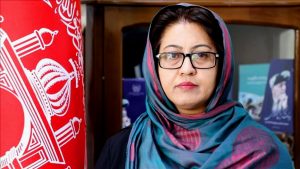All obstacles to peace talks will be removed

As the time for inter-Afghan talks approaches and the citizens insist on a permanent ceasefire, officials at the Ministry of State for Peace are announcing the government’s efforts to remove obstacles to peace talks.
In an interview with the CSHRN, Najia Anwari said that since ceasefire from the beginning of negotiation is the demand of all Afghans, the government of Afghanistan is working to eliminate obstacles to the progress of peace. She added that the peace agreement should lead to a permanent cessation of hostilities and pave the path for peace and reconciliation in different parts of society.
CSHRN: Does the government’s negotiation team have the necessary preparation and capacity to participate in these talks?
Anwari: The peace negotiating team was created after extensive consultations with politicians and influential Afghans. Men and women of diverse ethnic and linguistic backgrounds who are educated, professional, experienced, and are politically supported are considered to form an inclusive structure.
According to her, the team has worked to improve its skills and strengthen the necessary capabilities since its inception.
CSHRN: What have been the government’s plans to strengthen the quality of the negotiating team so far?
Anwari: High quality training programs have been established with the aim of strengthening the skills of negotiators and information in various sections has been prepared to increase technical capacity and strengthen the content that the members of the negotiating team should possess with respect to peace.
At the same time, she added that conducting the recent meetings with the people and receiving their views and suggestions on the peace process have added to the richness of the information of the members of the negotiating team.
CSHRN: What issues related to women will be discussed in the talks?
Anwari: It is too early to talk about, but the government and the Ministry of Peace Affairs are holding extensive consultative meetings with various groups of women, both rural and urban, to write down their demands and defend them in the negotiations.
She also added that the Afghan government is entering into negotiations with the Taliban leadership who has the authority to decide and implement future agreements.
CSHRN: Has there been any change in the Taliban’s view of women?
Anwari: Afghan society has moved towards using women ‘s capacities and abilities for the prosperity of the society. The Taliban cannot deny this obvious fact.
According to Najia Anwari, Afghan women in the light of Islamic norms and Islamic culture want a strong and active role in the development and peace in the country.
CSHRN: Do female members of the negotiating team have the necessary capacity for the negotiations?
Anwari: Women in the negotiating team have long-term political experience, higher quality education, social work background, and major governmental and non-governmental responsibilities and are fit to participate in the negotiation.
According to her women’s presence in peace talks is effective because they are the main victims of war economically, psychologically, emotionally, and culturally. Therefore, they will put serious efforts to establish reconciliation and sustainable peace.